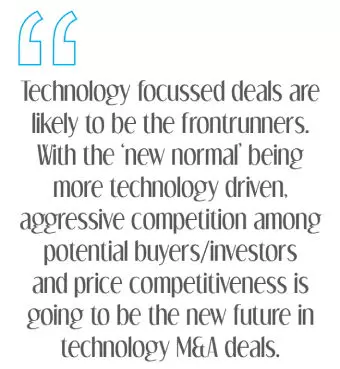- Home
- News
- Articles+
- Aerospace
- Artificial Intelligence
- Agriculture
- Alternate Dispute Resolution
- Arbitration & Mediation
- Banking and Finance
- Bankruptcy
- Book Review
- Bribery & Corruption
- Commercial Litigation
- Competition Law
- Conference Reports
- Consumer Products
- Contract
- Corporate Governance
- Corporate Law
- Covid-19
- Cryptocurrency
- Cybersecurity
- Data Protection
- Defence
- Digital Economy
- E-commerce
- Employment Law
- Energy and Natural Resources
- Entertainment and Sports Law
- Environmental Law
- Environmental, Social, and Governance
- Foreign Direct Investment
- Food and Beverage
- Gaming
- Health Care
- IBC Diaries
- In Focus
- Inclusion & Diversity
- Insurance Law
- Intellectual Property
- International Law
- IP & Tech Era
- Know the Law
- Labour Laws
- Law & Policy and Regulation
- Litigation
- Litigation Funding
- Manufacturing
- Mergers & Acquisitions
- NFTs
- Privacy
- Private Equity
- Project Finance
- Real Estate
- Risk and Compliance
- Student Corner
- Take On Board
- Tax
- Technology Media and Telecom
- Tributes
- Viewpoint
- Zoom In
- Law Firms
- In-House
- Rankings
- E-Magazine
- Legal Era TV
- Events
- Middle East
- Africa
- News
- Articles
- Aerospace
- Artificial Intelligence
- Agriculture
- Alternate Dispute Resolution
- Arbitration & Mediation
- Banking and Finance
- Bankruptcy
- Book Review
- Bribery & Corruption
- Commercial Litigation
- Competition Law
- Conference Reports
- Consumer Products
- Contract
- Corporate Governance
- Corporate Law
- Covid-19
- Cryptocurrency
- Cybersecurity
- Data Protection
- Defence
- Digital Economy
- E-commerce
- Employment Law
- Energy and Natural Resources
- Entertainment and Sports Law
- Environmental Law
- Environmental, Social, and Governance
- Foreign Direct Investment
- Food and Beverage
- Gaming
- Health Care
- IBC Diaries
- In Focus
- Inclusion & Diversity
- Insurance Law
- Intellectual Property
- International Law
- IP & Tech Era
- Know the Law
- Labour Laws
- Law & Policy and Regulation
- Litigation
- Litigation Funding
- Manufacturing
- Mergers & Acquisitions
- NFTs
- Privacy
- Private Equity
- Project Finance
- Real Estate
- Risk and Compliance
- Student Corner
- Take On Board
- Tax
- Technology Media and Telecom
- Tributes
- Viewpoint
- Zoom In
- Law Firms
- In-House
- Rankings
- E-Magazine
- Legal Era TV
- Events
- Middle East
- Africa

M&A Deals: Technology Sector Is Driver

M&A Deals: Technology Sector Is Driver Statistics for the mergers and acquisitions (M&A) activity in the year 2020 showed technology M&A spending was the highest since the dot-com collapse as the total value of technology and telecom transactions touched USD 600 billion "The secret of change is to focus all of your energy, not on fighting the old, but on building...
To Read the Full Story, Subscribe to Legal Era News
Access Exclusive Legal Era Stories, Editorial Insights, and Expert Opinion.
Already a subscriber? Sign in Now
M&A Deals: Technology Sector Is Driver
Statistics for the mergers and acquisitions (M&A) activity in the year 2020 showed technology M&A spending was the highest since the dot-com collapse as the total value of technology and telecom transactions touched USD 600 billion
"The secret of change is to focus all of your energy, not on fighting the old, but on building the new."
-Socrates
The year 2020 was marked by an economic slowdown with the onset of the pandemic. However, the statistics for the mergers and acquisitions (M&A) activity in the year 2020 showed technology M&A spending was the highest since the dot-com collapse as the total value of technology and telecom transactions touched USD 600 billion . This surge in transactions in the technology industry can be seen as an acknowledgement of the role that technology will play in the post COVID era and companies have rushed to bank on any opportunity that may drive them to the new virtual future.
We highlight some of the main players among the 2020 buyers in the technology industry from Ciesco's and Bird & Bird's '2020 Global M&A Review and 2021 Outlook' report (the Report), which you can find here. The acquisition by Salesforce of Slack Technologies for USD 27.7 billion in 2020 is the largest deal in the cloud SaaS industry to date. Twitter and Cognizant acquired 7 companies each in 2020. It was a slow year for tech giants like Facebook and Alphabet (Google's parent company) with fewer acquisitions largely due to the anti-trust and anti-competition law regulatory pressures they have been facing for 'monopolising' their relevant sectors. Other notable transactions in the industry were Verizon's acquisition of BlueJeans, a cloud-based videoconferencing and events platform and Zoom's acquisition of Keybase for its end-to-end encryption expertise. We continue to see a number of M&A transactions in Europe for our Indian headquartered technology sector clients.

As stated in the Report, the focus of the active technology buyers has shifted from the data and content production focussed companies in 2019 to digital media solutions, online gaming, cloud-based solutions and online marketplaces. This is also driven by a change in the consumer behaviour where consumers now prefer to eat, shop, socialise and entertain themselves from within their homes making traditional options less relevant.
Legal issues in technology transactions
Bird & Bird's long-term strategic focus has been on industries that are being disrupted by technology. In this article, we will discuss the key legal issues in technology M&A transactions at each stage. This article focuses on particularities and processes in technology transactions without any emphasis on a specific jurisdiction.
A. Deal structuring
Most of the technology deals are private deals and usually involve one or more VC or PE firms. These firms generally require set up of a new holding company structure for deal implementation. Determination of the jurisdiction and the corporate form of the holding company is critical to the deal and is based on factors such as tax efficiency, flexibility of the legal framework to organise the governance structure of the company, acceptability to the broader investor community to facilitate subsequent funding rounds, the possibility to include differential and preferential shareholder rights in the constitutive documentation and facilitation of an exit or an eventual public listing.
It is also important to consider if the transaction will conclude as an asset or share deal and how the price will be determined (based on last audited accounts i.e. a locked box approach or a completion accounts mechanism where under the enterprise value will be adjusted based on completion accounts prepared by the buyer post acquisition).

B. Due Diligence
The next step is to identify the assets on which due diligence should be performed. In a technology company, intellectual property (IP) is invariably the primary asset being purchased. The areas of focus for IP due diligence involve verification of ownership and control of IP assets, strength and value of IP assets, liability for infringement, if any and assignability. Depending on the nature of the technology being used, there may also be concerns regarding data protection and data may be an important asset in a business being acquired. With implementation of the General Data Protection Regulation (GDPR) in the European Union and the United Kingdom and increased risk of financial penalties for a failure to comply with the relevant rules and with further data regulation expected in the near future in many countries, buyers are asking more questions and increasingly expecting data privacy compliance, particularly where the target is a data heavy business.
Due diligence also needs to establish if any previous security breaches may result in continuing liabilities whether from a compliance perspective or from the perspective of potential litigation. Further, some data sources are critical to a company's business and are often subject to licence agreements. As part of the due diligence checks, it is important to identify potentially problematic terms and those which deviate from industry norms and advise on the associated risks.
When conducting due diligence exercises, especially in start-ups in the technology sector, we often notice that the target does not own the core IP assets – in some cases, the assets might be owned by the founders in their individual capacity or by third parties without adequate / industry acceptable licensing arrangements in place; in other cases, they might be owned by developers who worked for the company on a consultancy basis. We recently advised a venture capital firm on investment in a company developing case management software for lawyers to put in place necessary IP assignment arrangements between the target and its affiliate in India and simultaneously advised on protection of the target's IP from the development work being undertaken by its affiliate's employees in India. As part of due diligence, such risks need to be identified and resolved prior to completion by requiring the company to put in place appropriate intellectual property assignment or licensing arrangements with the third party who owns the underlying IP.
C. Transactional documentation
As part of the transactional documentation, it is key that necessary and adequate warranties and indemnities must be negotiated. The common grounds of discussion revolve around the aggregate liability cap of the seller/founder under the warranties and indemnities. The most common warranty claims arise in relation to, financial statements, IP, compliance with law and material contracts. Due to the volatile and increasingly evolving environment in the technology sector, we are finding the standard warranty catalogue to be inadequate in technology transactions and it is important for the warranty catalogue to be adapted to the nature of the target's business and core assets. Governing law and dispute resolution provisions will be important points to consider in the context of transaction documentation. We have recently worked on the disposal of an Indian based social games developer to a European listed acquirer where English law was chosen as the compromise between the parties. We have seen a number of deals where parties have chosen English law along with an appropriate arbitration provision to govern transaction documents even where the buyer and seller are not located in the UK, as they derive comfort from the approach under English law to enforcement of contractual terms and the amount of legal precedent available to assist in the interpretation of contract provisions.
Specialist insurance is increasingly available that may provide cover against breach of general warranties and indemnities and even specific intellectual infringements. When advising the seller on a recent M&A transaction in the UK, the buyer uncovered a concern that the target company might be infringing a third party's patent. We were able to assist the seller in obtaining both general warranty and indemnity insurance and specific intellectual property infringement insurance, which allowed the seller to achieve a "clean exit" while still offering the buyer a level of desired protection through insurance.
D. Post closing actions/ integration
While warranties and/or indemnities protect the buyer from historical risks, any risks or gaps identified during the due diligence should be remedied to protect from the risk of any future liability (for example, fixing IP ownership issues or putting in place adequate data licensing arrangements). It is also necessary to plan and put in place any transitional services/management agreements (as founders or the existing management are usually key in technology companies) and consider new internal policies to make sure that the company's compliance levels fit into the buyer/investor group's compliance structure.
As enactment of data privacy/protection laws is imminent in India and several other countries, multi-national companies need to ensure that their global compliance programmes follow GDPR requirements as well as local laws. We recently advised a Spanish fund client on investment in the tech transmission business based in the Netherlands, UAE and India, especially in relation to the GDPR compliance of the target group and policies to ensure compliance post acquisition.
Future outlook
As the Report points out, technology focused companies are sitting on cash piles and are keen to make further investments in 2021. Technology focused deals are likely to be frontrunners. With the 'new normal' being more technology driven, aggressive competition among potential buyers/investors and price competitiveness is going to be the new future in technology M&A deals.
2 451 Research's M&A KnowledgeBase
Disclaimer – The views expressed in this article are the personal views of the authors and are purely informative in nature.


